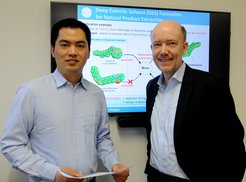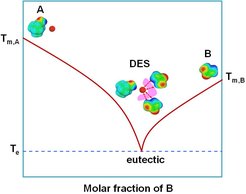Retrieve Valuable Vitamin E from Waste Products
International Cooperation: Sino-German Research Project between Max Planck Institute Magdeburg, Otto-von-Guericke University Magdeburg, and East China University of Science and Technology in Shanghai
On 1st April 2019, in a joint Sino-German research project, the group of Prof. Dr.-Ing. Kai Sundmacher, Director at the Max Planck Institute for Dynamics of Complex Technical Systems (MPI-Magdeburg) and Professor of Otto-von-Guericke University (OVGU) in Magdeburg, started a close collaboration with the group of Prof. Zhiwen Qi, Professor of the East China University of Science and Technology in Shanghai (ECUST), China. The aim is to extract Vitamin E from deodorizer distillate which is a highly valuable stream from vegetable oil production in China and many other countries. The key idea is to use so called Deep Eutectic Solvents (DES) for this purpose.

The new Sino-German joint research project entitled "Computer-Aided Design (CAMD) of Deep Eutectic Solvent (DES) based Processes for the Separation of Natural Components from Liquid Mixtures" has started with effect of April 1st 2019. Essentially, the scientists of the Max Planck Institute for Dynamics of Complex Technical Systems and their partners at the East China University of Science and Technology (ECUST) in Shanghai will try to extract Vitamin E from deodorizer distillate which is a highly valuable stream from vegetable oil production in China and other countries. The key idea is to use so called Deep Eutectic Solvents (DES) for this purpose.
DES refer to mixtures of Lewis or Brønsted acids and bases, which feature a much lower melting point than each of the individual components. In contrast to volatile organic solvents, DES have many unique physicochemical properties such as negligible vapor pressure, high thermal stability, and a wide range of liquid phase existence. Moreover, DES can be easily prepared from cheap and sustainable sources (e.g., organic salt and hydroxyl-, carboxyl-, or amino-containing organic alcohols or acids), which results in low cost, non-toxicity and biodegradability. More interestingly, different combinations of available components make the properties of DES tunable in a wide range. These unique characteristics render DES as economically effective and sustainable solvents for various chemical processes, but in particular for the mild separation of valuable compounds from natural products. So far, DES-based studies are still limited to the experimental testing of different combinations for DES formulation. However, for exploiting the full potential of DES, systematic methods for optimal DES component selection and process design are highly desirable.

Combining the competencies of both research groups, the ultimate goal of this joint project is to find the optimal integrated solution, i.e., the DES chemical composition and the separation process configuration for the production of valuable natural components. In this project, the extraction of α-tocopherol (Vitamin E) from the vegetable oil distillate by-product is considered as an example of high practical relevance, to which the group of Prof. Zhiwen Qi has devoted substantial experimental research activities. The group of Prof. Kai Sundmacher will contribute their knowledge and competence in the field of computer-aided molecular and process design. In the next three years, post-doctoral research associates and Ph.D students from the two groups will collaborate closely to fulfill the high-level objectives of this project.

This joint Sino-German research project follows a long standing partnership of ECUST with MPI-Magdeburg and OVGU. It will be supported by the Deutsche Forschungsgemeinschaft (DFG, German Research Foundation) and the National Natural Science Foundation of China (NSFC).
Zhen Song / Gabriele Ebel


